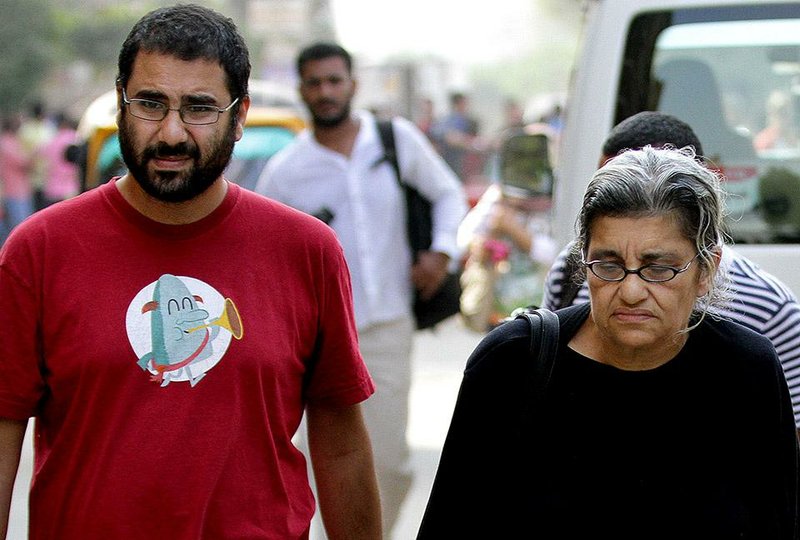CAIRO -- An Egyptian court on Sunday convicted 23 activists of staging an illegal demonstration, sentencing them each to three years in jail in the latest crackdown by authorities on the secular, pro-democracy movement behind the 2011 uprising against longtime ruler Hosni Mubarak.
The Cairo court also fined the defendants, who include at least seven women, about $1,400 each and ordered that they be placed under police surveillance after they serve their sentence.
The case is rooted in a peaceful demonstration in June that the defendants purportedly participated in near the presidential palace in Cairo's Heliopolis suburb. The demonstration was called to protest a law adopted late last year that severely restricts the right to stage street protests.
The defendants have also faced other charges, including damaging public property and assaulting policemen.
The conviction of the 23 is the latest in a government crackdown against secular, pro-democracy activists, many of whom were iconic figures of the uprising that forced Mubarak to step down in February 2011. A parallel crackdown has meanwhile killed hundreds of Islamists and jailed thousands since July of last year.
Many of those secular activists joined the millions who rose up against Islamist President Mohammed Morsi in June 2013 ahead of a military takeover led by then-military chief Abdel-Fattah el-Sissi -- who took office in June of this year after his landslide victory in presidential elections held the previous month.
Morsi, Egypt's first freely elected president, appeared to encourage the nearly daily protests by university students loyal to the Muslim Brotherhood, the Islamic group of which he has been a senior member. In a message published by the Brotherhood's official website, Morsi said he was inspired by the "resolve of the creative youths in the revolution's squares and universities."
The authenticity of the message could not be verified, but Morsi, who is in detention and faces a myriad of trials on charges carrying the death penalty, had in the past smuggled messages to supporters. The latest one was purportedly marking the new Islamic, or hijri, year.
Among the 23 convicted Sunday was Sanaa Seif, who hails from a family of longtime rights campaigners, including her late father, Ahmed Seif al-Islam, and brother Alaa Abdel-Fattah -- who was released from prison in September. He awaits his retrial on a 15-year prison sentence he received for breaking the protest law and assaulting an on-duty police officer.
Sanaa Seif has been on a hunger strike for nearly two months. She was briefly released in August along with her brother to attend their father's funeral. During that appearance, she looked to have lost a great deal of weight.
Another defendant convicted Sunday is Yara Sallam, a prominent rights lawyer.
Sunday's verdict, which can be appealed, comes at a time when Egypt is swept by nationalist sentiments after a dramatic surge in attacks on troops and security forces -- blamed on Islamic militants in the Sinai Peninsula -- and a campaign targeting many of the secular pro-democracy campaigners behind the 2011 uprising.
Suspected militants killed at least 30 army soldiers in the restive region north of Sinai on Friday, the deadliest attack on the Egyptian army in decades. In newspaper articles and television talk shows, media celebrities loyal to el-Sissi over the weekend urged the general-turned-politician to step up military actions against the militants and to clamp down on dissent.
El-Sissi has described the battle against the militants as "existential" and accused foreign parties he did not name of involvement in the latest attack. He has also imposed a night-to-dawn curfew in the northern part of Sinai and declared a national three-day state of mourning.
"Don't let Sinai be your final goal Mr. President," columnist Mahmoud al-Kardousy wrote in Sunday's edition of the daily al-Watan. "If necessary, declare Egypt from Aswan [Egypt's southernmost city] to Matrouh [northernmost city] a military base, let the hand that writes a word against you be chopped off and the tongue that dares ask you 'What are you doing?' be cut off too."
Critics of el-Sissi's government maintain that placing draconian conditions on street demonstrations has robbed Egyptians of a major avenue of expression, leaving them with social media as virtually the only venue in which to air their views. El-Sissi counters by saying the law mirrors similar regulations in force in Western nations.
The Interior Ministry, which controls the police, recently has announced it would expand monitoring of all social media networks to protect the nation's interests.
A Section on 10/27/2014
